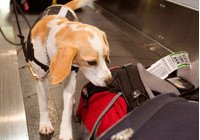
Ten-week-old Charleston and Roxy (brother and sister) joined the Ministry for Primary Industries’ detector dog programme two weeks ago.
If all goes well, they will start sniffing out food and plant materials at New Zealand’s airports and ports after 12-14 months of training.
“They’ve been bouncing around our kennels brimming with enthusiasm, so we are very hopeful they will make the grade,” says Brett Hickman, MPI Detection Technology Manager.
Charleston is due to move in with an Auckland family this weekend under the puppy-walking phase of his training. Puppy walking involves socialising new dogs so they get used to working around people. Roxy will go to her foster home a week later.
MPI sourced the puppies from a breeder based in Hastings.
“We have our own beagle breeding programme, but it’s great to bring in new dogs to increase our genetic diversity,” says Hickman.
MPI has forty biosecurity detector dog teams operating at the border.
Detector dogs are great at picking up seeds and plants that can be hard to detect by MPI’s x-ray machines at the border, Hickman says.
They are said to also screen people faster than x-ray, and their visual presence helps remind people about New Zealand’s biosecurity rules.
Hickman says MPI is always on the lookout for new dogs that have the potential to work at the border sniffing out biosecurity risk items.
Information on selection criteria is available on the MPI website.



 Classifieds
Classifieds



